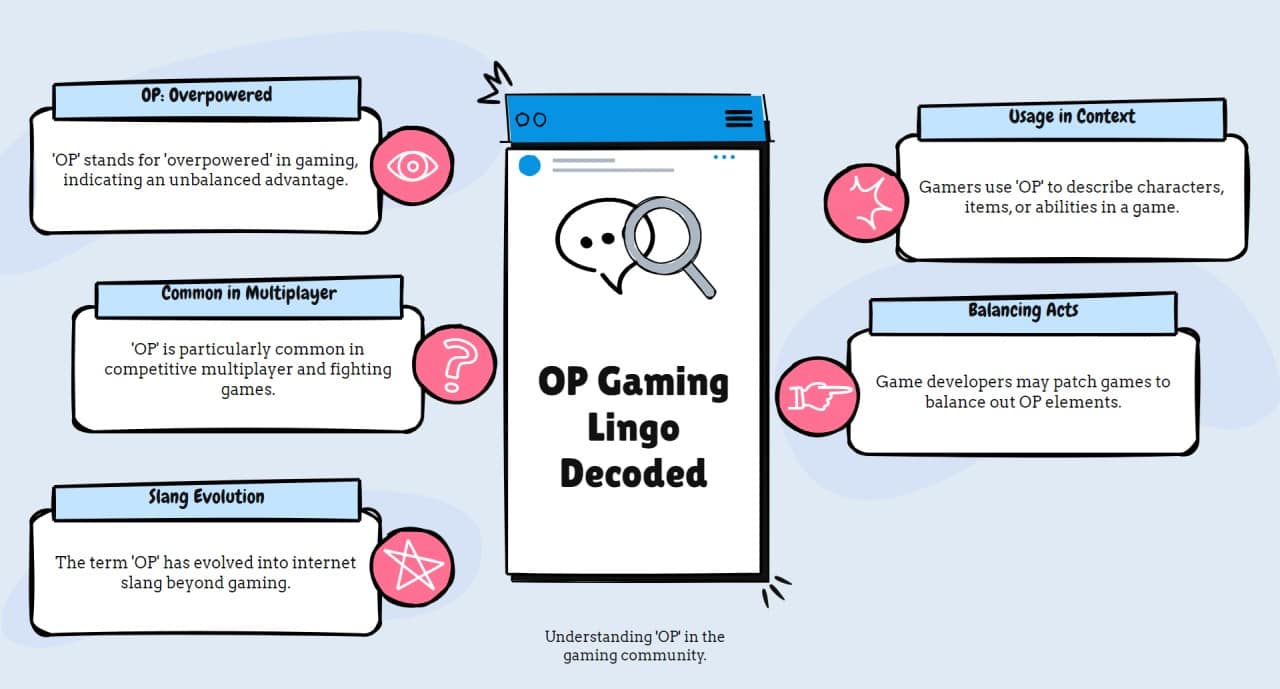Struggling to understand gaming terms? OP in the gaming world means “overpowered,” indicating something too strong. This article will break down how knowing OP can elevate your game strategy.
Read on to get ahead.
Key Takeaways
OP means “overpowered” in gaming, showing something is too strong.
Knowing about OP helps players find strategies to win games.
Game balance is important, so no one weapon or strategy is too dominant.
Strategy guides can help gamers use OP elements to their advantage.
Being OP affects how fun and challenging a game is for everyone.
Table of Contents
Explaining “OP” in Gaming

OP means “overpowered” in gaming talk. It shows that something in the game is too strong compared to everything else. This could be a weapon, character, or skill. Gamers say “OP” when one thing can win easily without much effort from the player.
This term is not just for action or strategy games. It’s also used in online casinos where certain promotions seem too good, like no deposit bonuses at sites such as https://gry-hazardowe-zadarmo.com/darmowe-50-zl-za-rejestracje/
These offers pull in new users by giving them a big advantage.
Learning about ‘OP’ helps gamers spot what might give them an edge.
Next, let’s look into scenarios where “OP” is commonly said among players.
Scenarios Where “OP” is Commonly Used

In video games, players often talk about “OP” during game balance chats and while making guidebooks. They use “OP” to point out super strong characters or moves that can change how a game is played.
Discussing Game Balance
Game balance is crucial. It ensures no character, weapon, or strategy overshadows others. Developers adjust stats, drop rates, and damage to keep gameplay fair. For instance, they might “nerf” a too-strong sword, so other weapons can compete.
What OP means in gaming: when used in the context of online gaming, OP stands for “overpowered.” To say that a character, weapon, or skill is OP is to say that they’re so strong that it gives the player an unfair advantage over others. It’s overpowered because it’s better than anything else in the game.
https://www.businessinsider.com/guides/tech/op-meaning
I’ve seen games change drastically after updates. A once-dominant strategy becomes less effective when developers introduce balance changes. This keeps the game fresh and challenges players to find new ways to win.
Crafting Strategy Guides and Tutorials
Crafting strategy guides and tutorials is crucial for gamers looking to enhance their play. They break down complex topics into manageable steps, making it easier to grasp advanced tactics.
- Start by picking a game that has a lot of depth, like “Valdis Story,” known for its challenging gameplay.
- Use clear examples to explain terms like “OP” which means overpowered, helping players understand why certain characters or skills dominate.
- Highlight common scenarios where understanding OP elements can turn the tide in games, such as boss fights or PvP battles.
- Walk through the process of identifying OP strategies by analyzing game forums and social media platforms where players share insights.
- Create sections on balancing gameplay, showing how nerfed (weakened) or buffed (strengthened) items affect overall strategies.
- Include visual aids like screenshots from games or short clips demonstrating OP tactics in action within popular titles like Destiny 2.
- Offer advice on adjusting strategies when game updates change the meta – the most effective tactics available.
- Discuss alternative strategies for when favorite tools or characters get nerfed, encouraging flexibility and innovation.
- Incorporate feedback from readers who try out your guides, using their experiences to refine and update content regularly.
- Lastly, encourage players to experiment with different approaches, reminding them that finding new OP combinations is part of the fun.
By following these steps, gamers can craft guides that not only improve individual play but also contribute to the larger gaming community’s knowledge base.
The Effects of Being “OP”

Being OP changes how games feel. It makes some players way too strong and can mess with the fun for everyone else.
Influencing Gameplay and Player Experience
OP characters or strategies change how we play games. They make us pick different heroes, try new moves, and join teams we wouldn’t otherwise consider. This shift influences both solo play and team efforts.
For example, in a shooter game, an OP weapon can lead everyone to use it. This changes the game’s balance and makes fights less varied.

These changes affect how much fun we have and challenge us to adapt. In Star Wars Galaxy of Heroes (SWGOH), knowing which teams beat the meta helps you win more battles. Using what you learn outside the game about popular chars informs your strategy inside it.
So, mastering OP elements means staying ahead in the game’s ever-changing landscape while still finding fresh ways to enjoy each session.
FAQs About the Meaning of “OP” in Gaming
What does OP mean in gaming?
OP means “overpowered” in gaming, a term gamers use when something is too strong or unbalanced. It can refer to characters, items, or strategies that give players an unfair advantage.
How does going AFK affect gameplay?
Going AFK—away from keyboard—leaves your team at a disadvantage. In online games, it’s like fighting with one less player, making winning harder for your team.
Can you explain the original poster in gaming forums?
The original poster is the person who starts a thread on gaming forums or social media platforms like Instagram or Google Play discussions. They kick off conversations about video games industry trends, strategies, or ask for advice.
What’s the most effective tactic available (META) in games?
META stands for the most effective tactic available—it’s what players consider the best strategy or character build at any given time. META shifts as games update and as new tactics emerge.
Why do gamers talk about buffing?
Buffing refers to strengthening a game character or item—making them more powerful. Game developers might buff underperforming elements to balance gameplay and keep strategies fresh.

